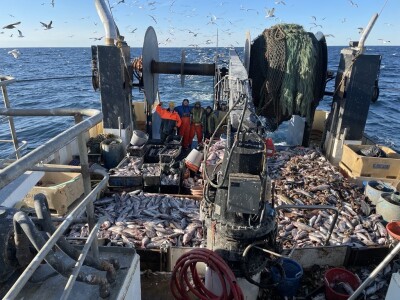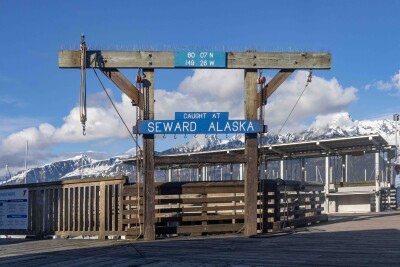Stop pot shots
From U.S. Coast Guard reports
Late into the second afternoon of a seven-day trip off the New England coast, the veteran skipper and three-man crew of a 70-plus-foot lobster boat was setting the last of four trawls.
Of the mile-long trawl's 40 traps, 25 were already in the water. The last 15 were unsecured, stacked in five rows, three traps high.
Two of the crewmen were tending the set at approximately 4 p.m. when one looked over his shoulder and saw a rogue wave sweeping toward the vessel. He yelled a warning to the other crewman and both ran toward the wheelhouse.
The first crewman reached the wheelhouse just as the vessel heeled over sharply. The other crewman was running past the traps when the starboard rail went under the water; the aft deck was awash in green sea and spray.
When the water cleared, the crewman was face down on deck, pinned against the running rail under several of the unsecured traps. The other crewman darted back out on deck and pulled the traps off his partner.
The freed crewman looked a little banged up, but made it into the wheelhouse under his own strength. He was in some discomfort, but coherent.
The two other crewmen went aft to straighten out the deck and secure loose gear. Eventually the skipper gave the go-ahead to set the remaining traps.
As the last trap was set, the skipper noticed the injured crewman was becoming very pale and his head was beginning to loll around. One crewman helped the injured man remove his boots and slicks and checked for outward signs of injury.
The injured crewman's deteriorating condition led the skipper to contact the Coast Guard, which established communications between him and the duty flight surgeon.
The injured crewman asked for a glass of water and was complaining about a pain low in the center of his chest. He started getting sick and then lost consciousness. He wasn't breathing, nor did he seem to have a pulse. The skipper directed that he be laid flat on deck.
Passing the phone to a crewman, the skipper immediately began administering CPR. Because the crewman had become sick before passing out, the skipper periodically had turned him on his side to clear the airway.
The skipper and remaining crew administered CPR for 15 to 20 minutes until the flight surgeon directed them to stop. Cause of death was later determined to be cardiac arrest brought on by blunt force trauma.
Lessons learned
Traps should be secured when not in use or when the vessel is transiting to and from fishing grounds. Thoroughly secure each layer of traps; it does little good to tie the top layer tightly if the bottom one is loose.
Before stacking gear, make sure that they won't cover hatches, block egress routes or access to vital machinery or prevent water from flowing through deck drains or freeing ports.
The skipper and crew, well trained in administering CPR, did all they could to revive their fellow crew member. They also monitored the weather and sea conditions. Having experienced one rogue wave already, they were watching for others.
Always be aware of your surroundings and fish safe!






